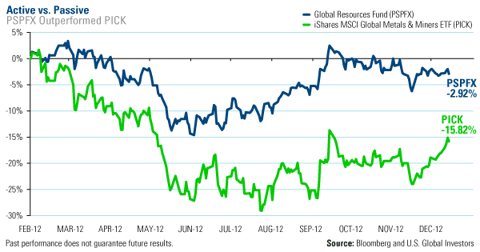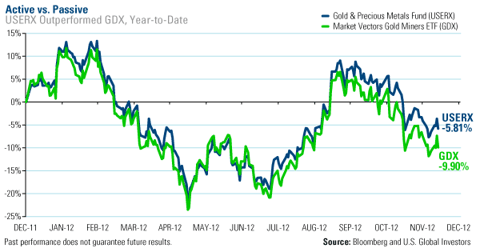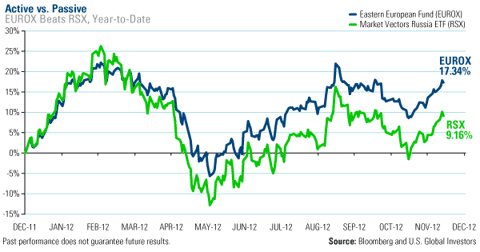Exchange-traded funds continued to attract assets in 2012 while money has been exiting equity mutual funds. Still a majority of assets continue to be invested in actively managed products: As of the end of 2011, of the nearly $13 trillion invested in funds, index and exchange-traded funds comprise only about 8 percent, according to the Investment Company Institute.
As active investment managers who have experienced bull and bear markets, the financial industry's deregulation and re-regulation, and the shifting needs of baby boomers, we are pleased that actively managed mutual funds continue to be the choice for a significant portion of portfolios.
The ETF industry has matured from its adolescent days, yet it continues to morph in puzzling ways that produce mediocre results. In my blog, I've discussed some eye-openers to help investors understand the risks of ETFs before putting their money in a product that might end up with unexpected outcomes.
Take the relatively new iShares MSCI Global Metals & Miners ETF (PICK), which began trading at the beginning of February 2012. The ETF is based on the MSCI ACWI Select Metals & Mining Producers Ex Gold & Silver Investable Market Index, which is a non-diversified basket of companies located in developed and emerging markets that are involved in producing or extracting metals or minerals. Its 10 largest holdings make up 50 percent of the index, which makes it a more concentrated, potentially more volatile, portfolio.
By comparison, as of November 30, 2012, the top 20 holdings in the Global Resources Fund (PSPFX) make up 43 percent of the overall portfolio.
In theory, one chooses a natural resources investment to gain access to the companies that stand to benefit from the world's growing needs of natural resources. In addition, commodities offer portfolio diversification, as they have historically had a lower correlation to the overall market.
However, in a face-off, PSPFX would steal the puck from PICK, as the Global Resources Fund has outperformed the ETF by nearly 13 percentage points since PICK's inception in January 2012.
PSPFX also added significantly more return with less risk compared to the ETF over the same timeframe. The Global Resources Fund experienced an annualized standard deviation of 15.95 percent compared to the PICK ETF, which had an annualized standard deviation of 24.34 percent, according to Morningstar Direct.
You can also compare two gold equity investment vehicles. Although gold miners have had a challenging year, the Gold and Precious Metals Fund outperformed the Market Vectors Gold Miners ETF (GDX) by 400 basis points.
As I often remind investors during presentations, there is no free lunch on the commodities table-every investment comes at a cost or a risk. When it comes to emerging markets and commodities, there are inefficiencies that we believe give active managers an edge. In emerging markets, the capital markets are not as sophisticated as in developed markets and the information can be less uniform and straightforward. Managers who have an explicit and tacit knowledge of the country and its way of doing businesses are likely able to flush out the best opportunities. We believe it is worth paying a bit more in management fees to get the expertise needed for these specialized markets.
The Eastern European area is a good example of a nuanced market. While the presidential reelection of Vladimir Putin in Russia caused markets to stress over how he would lead the country, Turkish stocks have experienced substantial growth. U.S. Global Investors' Eastern European Fund (EUROX) benefited from its ability to invest in the entire area: Russian stocks make up only about 37 percent of the fund while Turkey comprises 17 percent of the fund. See the fund's regional breakdown here.
We believe this is why we have significantly outperformed the Market Vectors Russia ETF year-to-date as of December 13, 2012:
Indexers often argue that active managers have periods of underperformance. Fellow Canadian Wayne Gretzky has been called the greatest hockey player ever, holding or sharing more than 60 records that he collected during his 20 seasons of playing in the National Hockey League. He holds the NHL record for the most hat tricks-achieving three goals in a single game more than 50 times-and when he retired, Gretzky was inducted into the Hockey Hall of Fame.
However, under asset management's rigid standards for active managers, the "Great One" might be considered a loser, as his team won the Stanley Cup "only" four times.
From time to time, active managers underperform; yet, they have the opportunity to add alpha. ETFs, on the other hand, are built to only match the benchmark and are never expected to beat it.
While ETFs offer instant execution, liquidity and lower fees, certain passive investments may not get you where you want to go over the long-term. The "hat trick" equivalent that Global Resources, Gold and Precious Metals, and Eastern European Funds has been able to achieve this year against their respective ETF peers is more diversification, better historical performance and less volatility.
Outlook on Natural Resources
Learn what our investment team believes will drive gold and natural resources in the new year by joining our Outlook 2013 webcast. Sign up today and email us with your questions, so we make sure we cover what's on your mind.
U.S. Global Investors, Inc. is an investment management firm specializing in gold, natural resources, emerging markets and global infrastructure opportunities around the world. The company, headquartered in San Antonio, Texas, manages 13 no-load mutual funds in the U.S. Global Investors fund family, as well as funds for international clients.
Please consider carefully a fund's investment objectives, risks, charges and expenses. For this and other important information, obtain a fund prospectus by visiting usfunds.com or by calling 1-800-US-FUNDS (1-800-873-8637). Read it carefully before investing. Distributed by U.S. Global Brokerage, Inc.
Foreign and emerging market investing involves special risks such as currency fluctuation and less public disclosure, as well as economic and political risk.
By investing in a specific geographic region, a regional fund's returns and share price may be more volatile than those of a less concentrated portfolio.
Gold, precious metals, and precious minerals funds may be susceptible to adverse economic, political or regulatory developments due to concentrating in a single theme. The prices of gold, precious metals, and precious minerals are subject to substantial price fluctuations over short periods of time and may be affected by unpredicted international monetary and political policies. We suggest investing no more than 5% to 10% of your portfolio in these sectors.
The Eastern European Fund invests more than 25% of its investments in companies principally engaged in the oil & gas or banking industries. The risk of concentrating investments in this group of industries will make the fund more susceptible to risk in these industries than funds which do not concentrate their investments in an industry and may make the fund's performance more volatile.
Because the Global Resources Fund concentrates its investments in a specific industry, the fund may be subject to greater risks and fluctuations than a portfolio representing a broader range of industries.
Disclosure: I am long GDX.


